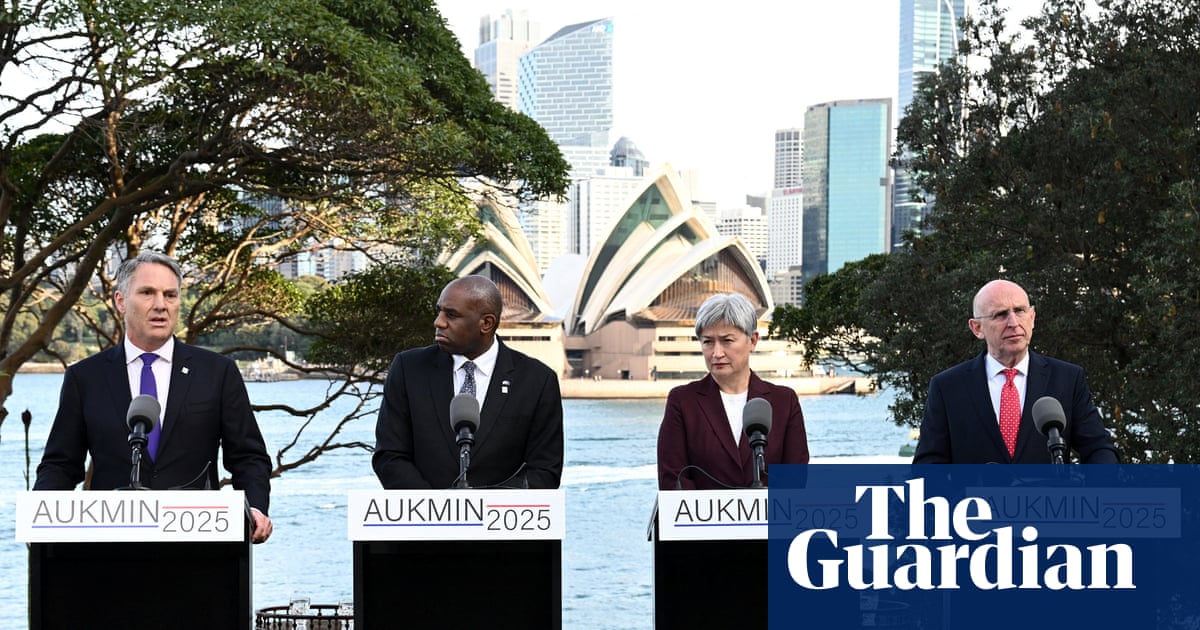Australia and the UK have signed a 50-year treaty to cement the Aukus pact to design and build a new class of nuclear-powered submarine.
Australia’s defence minister, Richard Marles, and the UK’s defence secretary, John Healey, signed the deal – dubbed the “Geelong Treaty” – in Geelong on Saturday, with Marles saying it was among the most significant treaties between the two nations.
It came as the US, which is not a party to the treaty, wavers on its own role in the trilateral Aukus agreement, after the Trump administration launched a review to examine whether it aligns with his “America first” agenda.
A joint statement released by the UK and Australia said the treaty would enable cooperation on the SSN-Aukus submarine’s design, build, operation, sustainment, and disposal, as well as workforce, infrastructure and regulatory systems.
The SSN-Aukus is intended to incorporate technology from all three Aukus nations. It will be built in northern England for the UK Royal Navy, and Australia plans to build its own in South Australia for delivery to the Australian navy in the 2040s.
The treaty is yet to be released publicly and will be tabled in parliament next week.
Marles told reporters the treaty will underpin how the UK and Australia work together to deliver the submarines.
He said there were three parts to the treaty, including training in the UK for Australian submariners and other required roles, and “facilitating the development” of infrastructure at the Osborne Naval Shipyard in Adelaide.
“And finally, what the treaty does is create a seamless defence industrial base between the United Kingdom and Australia. This project is going to see Australian companies supplying into Great Britain for the building of submarines,” he said.
“It will see British companies supplying to Australia for the building of our own submarines here in Adelaide.
Healey said the treaty would support tens of thousands of jobs in both Australia and the UK.
“It is a treaty that will fortify the Indo-Pacific. It will strengthen Nato and we’re the politicians signing it today. But this is a treaty that will define the relationship between our two nations and safeguard the security of our country for our children and our children’s children to come,” he said.
Marles said the deal was “another demonstration of the fact that Aukus is happening, and it is happening on time, and we are delivering it”.
“It’s a treaty which will last for 50 years. It is a bilateral treaty which sits under the trilateral Aukus framework.”
As part of the existing Aukus agreement, Australia will pay about $4.6bn to support British industry to design and produce nuclear reactors to power the future Aukus-class submarines.
It will pay a similar amount to the US to support America’s shipbuilding industry. Under the $368bn Aukus program, Australia is scheduled to buy at least three Virginia-class nuclear-powered submarines from the US from the early 2030s.
Earlier on Saturday, the UK foreign secretary, David Lammy, appeared at an event in Sydney run by the Lowy Institute.
Asked by the presenter if the UK was “coming to the rescue because America is losing interest in Aukus”, he said that wasn’t the case, and that the deal was about “20,000 jobs between our two countries” and a secure partnership well into the future.
Lammy dismissed concerns over the Trump administration’s Aukus review, saying it would “flush out any issues for them”. He said both the UK and Australian governments had also undertaken a review of the pact.
“All governments do reviews, and should do reviews, particularly when they involve big aspects of procurement and defence,” he said.
Lammy said the world had entered a “new era” of instability and that “investing in defence is an investment in peace” because opponents “realise that you are armed and capable”.
The Trump administration’s review is being headed by the Pentagon’s undersecretary of defence policy, Elbridge Colby, who has previously declared himself “sceptical” about the deal, fearing it could leave US sailors exposed and underresourced.
